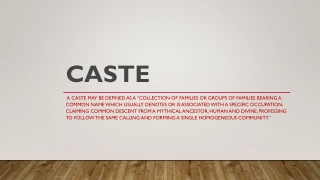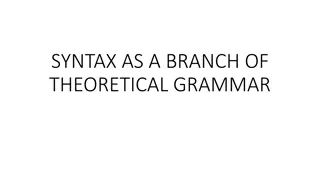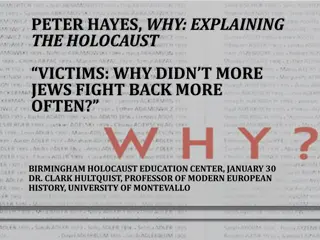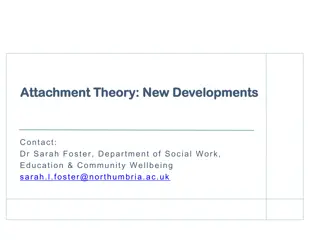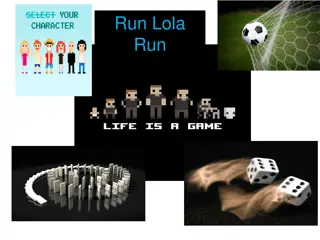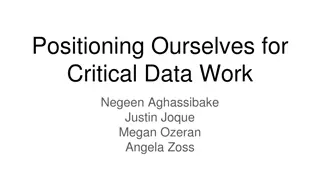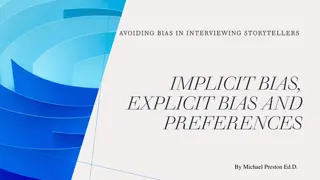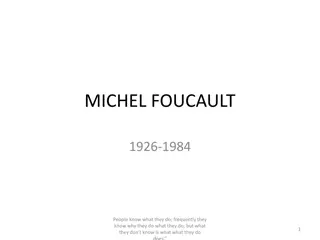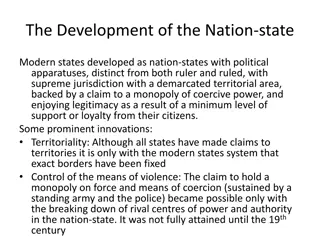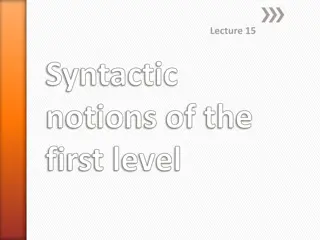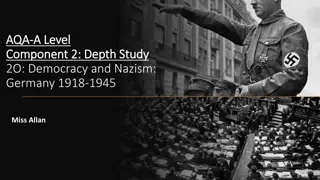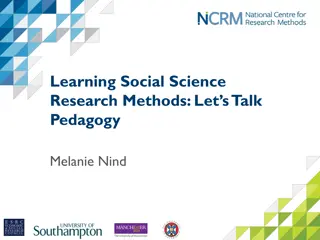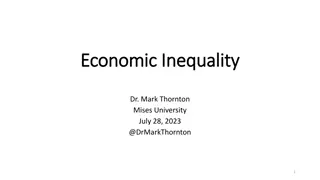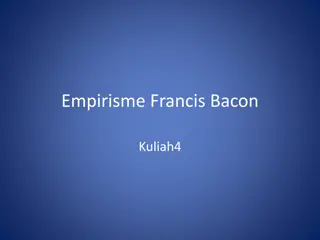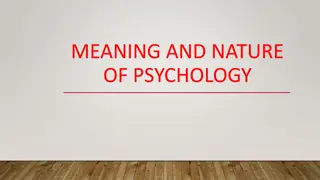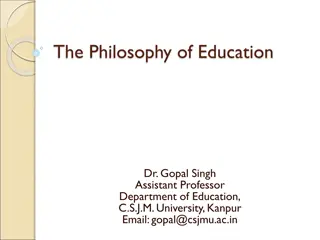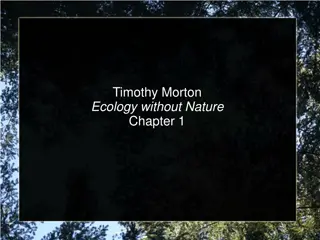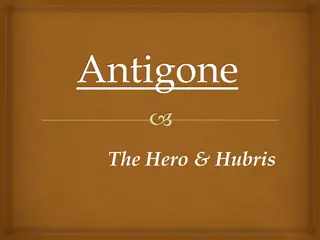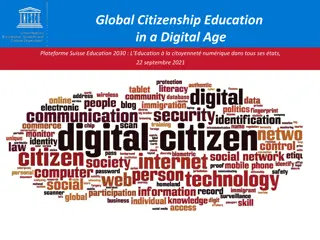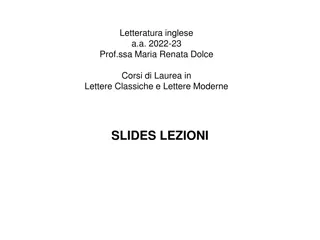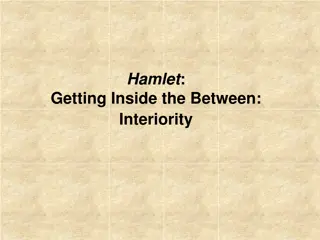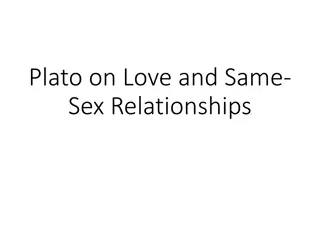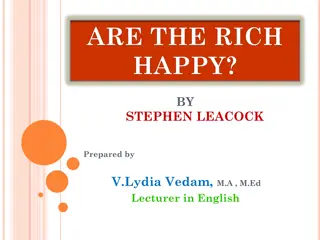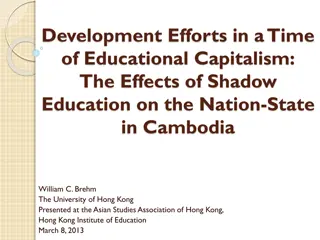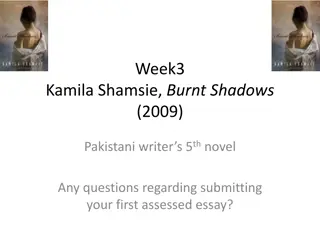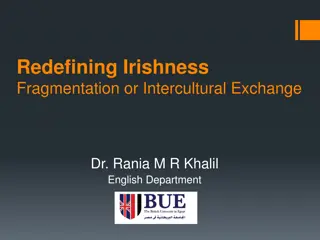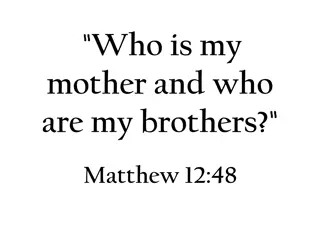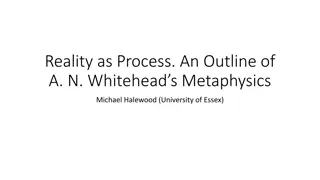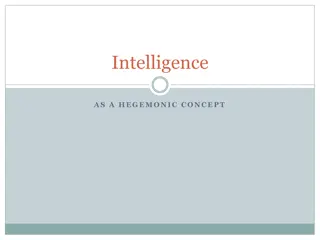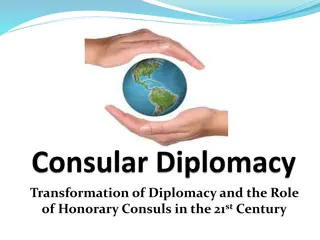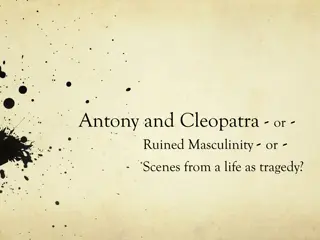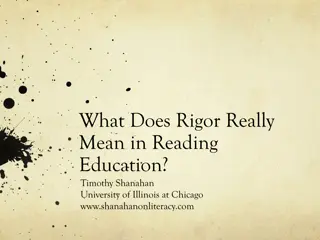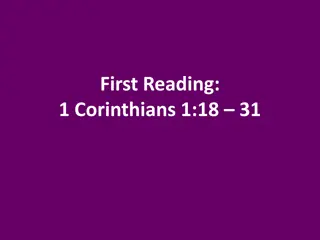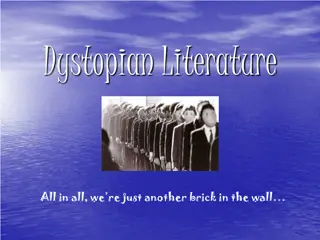Overview of Caste System in India
The caste system in India is a social structure defined by hereditary groups, each with specific occupations, rules, and traditions. Membership is based on birth, leading to a rigid hierarchy and limited mobility between castes. Endogamy, occupation, commensality, and purity are key features that sh
0 views • 17 slides
Analysis of "Valentine" by Carol Ann Duffy: Language, Structure, and Form
In "Valentine" by Carol Ann Duffy, the unconventional form with irregular stanzas and single-word lines creates a disjointed effect, emphasizing the forceful tone. The structure builds on the layers of an onion as a metaphor for love, gradually revealing the poem's meaning. The language uses an exte
3 views • 16 slides
Understanding Syntax in Theoretical Grammar
Syntax, as a branch of theoretical grammar, explores the combination of words in phrases and sentences, focusing on their relationships and functions in communication. Basic syntactic notions, such as syntactic units, syntactic meaning, and syntactic relations, play a crucial role in shaping the str
5 views • 17 slides
Understanding Resistance and Compliance in the Holocaust
Exploring the complex dynamics of why more Jews didn't fight back during the Holocaust, this content delves into the notions of compliance, resistance, and the harsh realities faced by the victims. Through the perspectives of historians such as Raul Hilberg and Yehuda Bauer, it examines the challeng
5 views • 11 slides
Modern Perspectives on Attachment Theory: Bridging Research and Practice
Delve into the contemporary developments in attachment theory within social work and education. Explore how practitioners and researchers are navigating outdated notions and embracing newer insights to enhance their understanding and application of attachment concepts.
1 views • 16 slides
Unraveling the Philosophical Layers of Run Lola Run
Dive into the intricate visual metaphor of life as a game in the film Run Lola Run, exploring themes of choice, self-determination, chance, and action-consequence. See how Tykwer blurs the lines between reality and fantasy while challenging traditional notions of control and fate. Discover the paral
2 views • 13 slides
Understanding Positionality and Indigenous Data Sovereignty in Critical Data Work
Explore the impact of positionality on data work, challenge notions of value-free research, and address issues of erasure and harm in Indigenous data sovereignty. Reflect on how personal values and experiences influence data understanding, and consider the rights of Indigenous peoples in owning and
5 views • 8 slides
Understanding Client Motivation for Change in Motivational Interviewing
Motivational Interviewing involves exploring and enhancing client motivation for change. Despite experiencing significant negative consequences, individuals may struggle to make behavioral changes. Motivation is a key factor in successful treatment outcomes, as more motivated clients tend to fare be
1 views • 50 slides
Understanding and Overcoming Bias in Interviewing
Bias in interviewing can arise from implicit and explicit prejudices, impacting perceptions and interactions with interviewees. Implicit biases are unconscious, while explicit biases are deliberate. Recognizing and addressing biases is essential to conduct fair and effective interviews. Examples ill
0 views • 17 slides
Exploring Michel Foucault's Theories on Power, Knowledge, and Institutions
Michel Foucault's work focuses on the relationship between power, knowledge, and social institutions. He challenges traditional notions of truth and explores how power shapes societal structures such as schools, prisons, and offices. Foucault's approach, from Archaeology to Discourse Analysis, sheds
0 views • 5 slides
Evolution of the Nation-State and Modern State Concepts
The development of the nation-state marks a significant shift in political organization, characterized by centralized power, territoriality, and legitimacy gained through citizen support. Key innovations include territorial demarcation, monopolization of coercion, impersonal power structures, and th
0 views • 8 slides
Understanding Normalcy and Empathy in Perception
Explore the concept of normalcy and empathy through engaging activities and discussions. Challenge preconceived notions of what is "normal" and develop empathy towards those who are different. Encourage open-mindedness and understanding of diverse perspectives.
1 views • 24 slides
Syntactic Notions of the First Level in Linguistics
In this lecture, the syntactic notions of the first level in linguistics are discussed, focusing on word groups, simple sentences, and the essential features of actual division. The different types of syntagmatic groupings of words, such as notional words, functional words, and their combinations, a
1 views • 19 slides
Understanding Democracy and Nazism in Germany (1918-1945) - A Level History Depth Study
Delve into the complex history of Germany from 1918 to 1945, focusing on the transition from democracy to Nazism. Explore key events like the rise of the Nazi Party, Hitler's dictatorship, and the impact of World War Two. Challenge preconceived notions of good and evil while enhancing your analytica
1 views • 12 slides
Exploring Pedagogy in Social Science Research Methods
Delve into the multifaceted realm of pedagogy in social science research methods, as discussed by Melanie Nind. Discover the complexities beyond traditional teaching methods, including theories, beliefs, and hidden dimensions shaping the learning process. Engage in thought-provoking questions and di
1 views • 6 slides
Economic Inequality and Human Freedom: A Perspective by Dr. Mark Thornton
Dr. Mark Thornton discusses economic inequality, individual uniqueness, and the importance of freedom in a society. He explores the various aspects of human inequality, challenges common notions of equality in markets, and emphasizes the role of reality in economic dynamics.
0 views • 20 slides
Exploring Empiricism: Francis Bacon and Classical Perspectives
Empiricism, as championed by Francis Bacon, emphasizes the role of sensory experience in forming ideas over innate notions. It asserts that the human mind is like a tabula rasa, developing solely through observation and experimentation. Various forms of empiricism, such as explanatory and genetic em
0 views • 9 slides
Understanding the Meaning and Nature of Psychology
Psychology is the scientific study of behavior and mental processes, evolving from early notions of soul study to the modern focus on behavior. The nature of psychology as a science emphasizes its theoretical and applied aspects, belief in cause-and-effect relationships, use of scientific methods, a
0 views • 6 slides
Understanding Different Views on Grace in Christian Theology
Various perspectives on grace are explored, from the Catholic concept of divine life infused by God to John Wesley's three-part process and Calvinist beliefs in irresistible grace for the predestined. The universalist viewpoint emphasizes acceptance and belonging for all, while debunking false notio
0 views • 21 slides
Exploring the Philosophy of Education with Dr. Gopal Singh
Philosophy of education examines teachers' personal philosophies that influence their teaching methods. Engaging in philosophy helps clarify intentions and justifications logically. Understanding key notions like self-identity and purpose is essential. Philosophical inquiry involves metaphysics, epi
0 views • 25 slides
Rethinking Ecology: Nature's Role in Human Society
Timothy Morton's "Ecology without Nature" challenges the traditional concept of "nature" and its interference with ecological progress in society. Through thought-provoking narratives and philosophical perspectives, Morton argues for a reevaluation of our relationship with the environment, emphasizi
3 views • 23 slides
Exploring the Notions of Heroism and Hubris in Greek Literature
Delve into the essence of heroism and hubris in Greek literature through an exploration of the qualities, virtues, and dangers associated with these concepts. Understand how hubris, defined as excessive pride, often serves as a tragic flaw that hinders heroes from achieving their goals. Unravel the
0 views • 12 slides
Global Citizenship Education in a Digital Age: Challenges and Responses
Challenges in digital societies include blurring responsibility notions, impact of digital tech, COVID-19 effects, and spread of hateful narratives. Educational responses aim to combat misinformation, promote diversity, develop critical thinking, and prepare individuals for current challenges, empha
1 views • 7 slides
Reflections on Punishment and Justice: A Philosophical Inquiry
Delving into the intersection of punishment, morality, and justice, this thought-provoking exploration questions the concept of proportionate punishment for crimes committed. It challenges conventional notions of retributive justice and poses ethical dilemmas related to the effectiveness of the crim
0 views • 8 slides
Exploring Black British Literature: Identity, Diversity, and Resistance
Black British literature challenges traditional notions of Britishness, exploring themes of identity, freedom, and cultural diversity. It encompasses works from writers of Caribbean, Asian, and African origins, reflecting a heterogeneous body of texts that resists easy categorization. The developmen
1 views • 92 slides
Exploring Hamlet's Interiority and Individual Identity
Delve into the complex themes of interiority, individual identity, and consciousness in Shakespeare's "Hamlet." Follow Hamlet's journey as he grapples with the idea of self, memory, and existence, challenging traditional notions of identity and embracing a modern sense of subjectivity. Analyze key s
0 views • 16 slides
Analysis of Wilfred Owen's Poem "Dulce et Decorum Est
Wilfred Owen's poem "Dulce et Decorum Est" vividly depicts the harsh realities of war, contrasting the romanticized notions of patriotism with the brutal truth of soldiers' sufferings. Through powerful imagery and irony, Owen challenges the glorification of war, showing the physical and mental toll
0 views • 14 slides
Exploration of Love and Same-Sex Relationships in Plato's Symposium
Delve into the rich discussions on love and same-sex relationships presented in Plato's Symposium. The text explores various perspectives, including notions of nobility, sexuality, and different types of love, shedding light on societal attitudes and philosophical reflections on these topics.
0 views • 9 slides
The Trials of the Rich: An Insightful Analysis by Stephen Leacock
Stephen Leacock reflects on his observations of the wealthy, debunking common misconceptions about their lifestyle. He delves into the financial burdens, societal pressures, and perceived hardships faced by the rich, contrasting them with the contentment found within more modest means. Through witty
0 views • 14 slides
Shadow Education and Educational Capitalism in Cambodia
Exploring the impact of shadow education on the nation-state in Cambodia, this analysis delves into the complex interplay between educational development, compulsory schooling, privatization practices, and the emergence of educational capitalism. It questions the traditional notions of nation-state
0 views • 8 slides
Exploring Themes in Kamila Shamsie's Burnt Shadows
Kamila Shamsie's fifth novel, Burnt Shadows, delves into the impact of war on love, loss, and human relationships across decades and continents. Through the stories of two families and the aftermath of the Nagasaki bombing, Shamsie challenges notions of nationhood, human cost of conflicts, and the e
0 views • 12 slides
Redefining Irish Identity in a Globalized World
Exploring the complexities of Irish identity in a post-colonial, globalized society through the lenses of cultural fragmentation, intercultural exchange, and the evolving narratives of contemporary Irish playwrights. The discourse delves into the challenges of maintaining a distinct Irish identity w
2 views • 15 slides
Contemplating the Meaning of Family in Matthew 12:46-50
Exploring the biblical passage in Matthew 12:46-50 where Jesus redefines family, emphasizing the importance of spiritual kinship through obedience to God's will rather than biological relationships. Jesus emphasizes that those who do God's will are considered family, challenging traditional notions
0 views • 15 slides
Exploring Reality as a Process in A.N. Whitehead's Metaphysics
Delve into A.N. Whitehead's metaphysical concepts, such as creativity and the multifariousness of the world, challenging traditional philosophical notions and questioning language's impact on intelligence. Discover Whitehead's texts post-1924 and his critique of Aristotelian logic, urging philosophy
0 views • 12 slides
Unpacking the Notions of Intelligence and Social Hegemony
This presentation delves into the complex concepts of intelligence and social hegemony, exploring historical perspectives, scholarly debates, and folk beliefs. It challenges the hegemonic nature of contemporary intelligence definitions and examines the power dynamics within civil society. Through a
1 views • 14 slides
Transformation of Diplomacy and Role of Honorary Consuls in the 21st Century
The evolution of diplomacy and the resurgence of honorary consuls in the modern era are highlighted in this discourse. It explores the shift from traditional notions of consular affairs to the current globalized landscape, emphasizing the growing significance of consular diplomacy in addressing citi
0 views • 21 slides
Masculinity in Shakespearean Tragedies: Ruined Identities and Emotional Conflicts
The selected excerpts from Shakespearean plays like "Romeo and Juliet," "Coriolanus," "Troilus and Cressida," "Antony and Cleopatra," and "Measure for Measure" portray a complex exploration of masculinity, where characters struggle with emotions, identity, and societal expectations. Masculine ideals
0 views • 21 slides
Understanding Rigor in Reading Education
Rigor in reading education is a topic of increasing interest due to dissatisfactions with current educational practices. This article delves into the meanings and implications of rigor, discussing how it plays out in reading instruction and highlighting the need for guidance in making reading materi
0 views • 49 slides
Reflections on Wisdom and Salvation in 1 Corinthians
The passage from 1 Corinthians 1:18-31 emphasizes the contrast between the world's wisdom and God's wisdom, showcasing how God's power is revealed through what the world perceives as foolishness. It highlights the significance of faith in Christ's sacrifice and the humility required to embrace God's
0 views • 44 slides
Understanding Dystopian Societies: A Comprehensive Overview
Explore the intricate realms of dystopian literature, delving into the contrasting notions of utopia and dystopia. Uncover the defining characteristics of dystopian societies, from oppressive controls to societal illusions. Dive into the various types of dystopian controls, including corporate, bure
0 views • 25 slides
